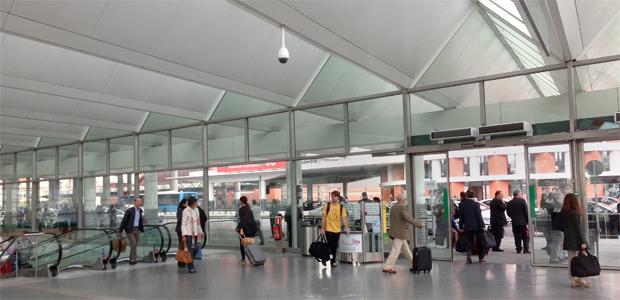Spain invests in technology to fight terrorism
In Madrid’s main train station, Atocha, surveillance cameras record virtually every platform, hallway, and entryway. A bomb attack here in 2004 killed 191 people and injured nearly 2,000. (Photo by Gerry Hadden.)
A month and a half since the Boston Marathon bombings, anti-terrorism professionals remain impressed that the suspects were captured so quickly.
Law enforcement authorities elsewhere in the world say they, too, hope to track down terrorists that fast — and prevent attacks — with the help of better technology. Spain is a case in point.
On the morning of March 11, 2004, a series of bombs ripped through commuter trains in Madrid’s main station, Atocha. Some 191 people died in the attack. Nearly 2,000 were injured.
It took three weeks for authorities to track down the suspects. Police cornered them in a Madrid apartment, where they blew themselves up.
Spanish security professionals say there are many reasons why the suspects were not identified sooner.
Richard Huelin, a retired Spanish army colonel who now runs a security website called Belt.es, said the Madrid bombings took place just a decade ago, but that that was a whole other age when it comes to anti-terrorism technology.
“Ten or 15 or 20 years ago, the technology was basically limited to phone taps,” he said. “The use of of closed-circuit TV’s was barely getting off the ground.”
And they were of limited use, both in terms of quality and storage.
“This limited our ability to analyze the images,” Huelin said, “for intelligence purposes.”
Consider the images the cameras in Atocha captured. They were grainy, and from a distance. And they didn’t reveal any clues as to the perpetrators. Nor were there cameras at the suburban stations where the suspects boarded the trains with the bombs.
Lacking such surveillance, police had to rely on more time-consuming technologies such as examining the chemical explosives to determine where they came from, and tracing the origins of the SIM cards in cellphone detonators used in bombs that malfunctioned.
Today, the story is very different. Passengers arriving at the Atocha station are filmed from the second they step off the train until they exit the station by state-of-the-art, high-resolution cameras. And the surveillance hardly stops there.
Javier Vidal, a retired military intelligence operative, said that Spaniards today live in a society under watch.
“You leave your house for work and you’re filmed by multiple cameras,” he said. “At the pharmacy, the tobacco shop, at banks.”
Vidal said that in March 2004, there wasn’t this avalanche of technology available for security — not to mention ordinary citizens’ smartphones, with near-instant video and photo capabilities.
Vidal and other Spanish security experts interviewed said that with today’s technology, authorities would have tracked down the terrorists much faster. The police here use facial recognition software. They have vast databases of digitized fingerprints and DNA samples, and programs to cross-reference it all instantly against data on suspected terrorists.
And Spain is developing its own technologies to thwart terrorists. Several Spanish companies are bringing unmanned aircraft to market — tiny helicopters and planes armed with cameras, including ones that use infrared to film at night. So far, their use has been limited to non-law-enforcement projects, such as monitoring forest fires. But retired colonel Ricardo Huelin said Spain’s anti-terrorist services want the mini-drones too.
“These unmanned aircraft are tiny,” he said, “and with good microphones that can record conversations on the street below.”
The images and sounds they record would go straight to a laboratory for analysis, he said.
“With the images and sounds we could ID people immediately,” he said.
And in the case of terrorists, he said, authorities could either track their movements or pick them up.
But to stop terrorists you first have to know who they are. And that’s where Huelin and other experts said technology reaches its limits, at least here in Spain.
A former anti-terrorism agent with Spain’s Civil Guard, Luis Jimenez of the Barcelona School of Criminology, said technology alone can’t sniff out terrorists, especially before they attack.
“Human intelligence is the most important factor,” he said. “You always need someone behind the machines.”
And not just to analyze the information.
“You need people who look for information out on the streets,” he said. “People who can get to know different groups, communities and so on.”
In other words, undercover agents. Informers. Spies.
Jimenez and others won’t talk about the extent to which Spain has infiltrated extremists groups.
But Huelin puts it this way when discussing technology and the fight against terrorism: Missiles don’t win wars — foot soldiers do.
Every day, reporters and producers at The World are hard at work bringing you human-centered news from across the globe. But we can’t do it without you. We need your support to ensure we can continue this work for another year.
Make a gift today, and you’ll help us unlock a matching gift of $67,000!
